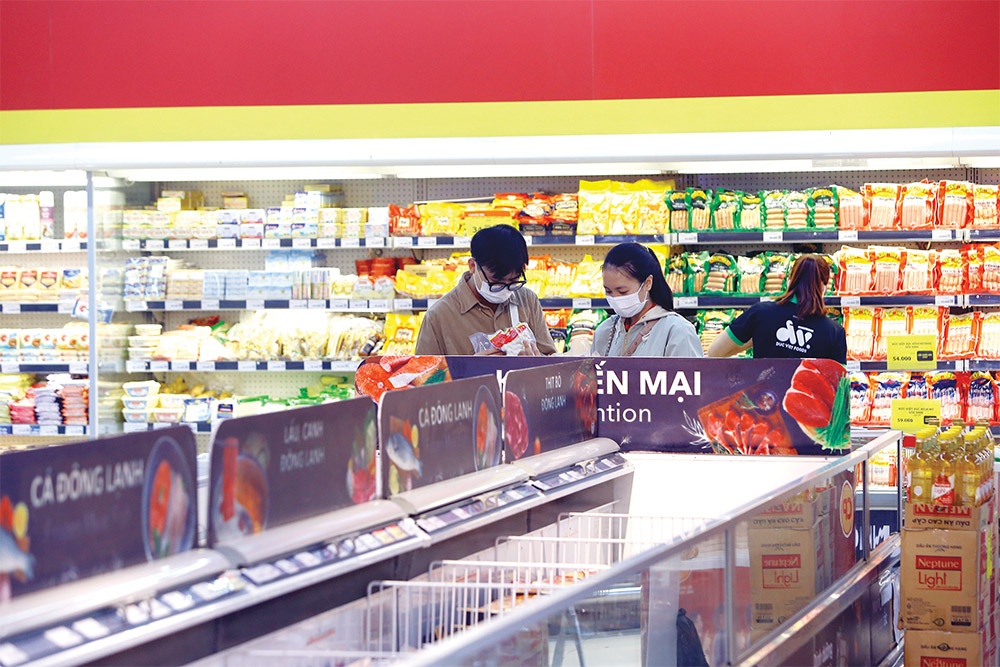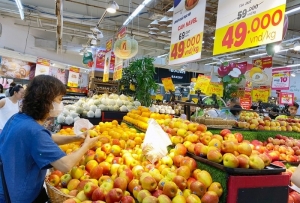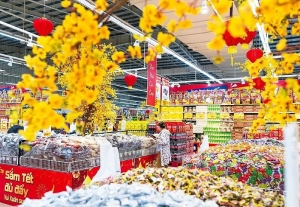Consumption rise uncertain until general recovery appears
 |
| Consumption rise uncertain until general recovery appears |
According to a report released by Infocus Mekong Research last week, consumer confidence has dropped somewhat in the past 12 months, fuelled by the real estate bubble burst, reduced exports, increased unemployment, reduced wages, and inflation.
The biggest concerns for consumers in 2024 are inflation, unemployment, and Vietnam’s economic slowdown, followed by pollution. New fears include global economic slowdown and bankruptcy. It is worth noting that all concerns seem to be increasing compared to a year ago.
In addition, the report indicates that 41 per cent of consumers loaned money in 2023, mostly from banks or friends. Around 44 per cent intend to take out a loan in 2024, and 62 per cent of all loans are for immediate survival and paying off debt, an increase of 12 per cent since 2021.
A key measure of consumer confidence is the ability to save money. Accordingly, 57 per cent of consumers noted a decline in savings and only 24 per cent experienced an increase in savings in 2023.
In terms of economic recovery, only 27 per cent of consumers believe recovery will happen in the first half of 2024, while 31 per cent believe it will occur in the second half of the year. The report noted that the figures suggest spending will be very conservative for most of this year.
Education and food and beverages shall see the biggest growth in spend for 2024, followed by household utilities and healthcare. Meanwhile, entertainment and dining out, home appliances, and personal electronics segments will suffer.
Last year revealed a few concerning trends in the market, including down-trading of both shopping venues and brands, reduction of shopping frequency, and a reduction in overall spending and savings.
Ralf Matthaes, managing director of Infocus Mekong Research, told VIR, “Since the late 1980s, Vietnam has experienced a tsunami of economic growth. However, the present recession has gauged into consumers earning and savings. Add to this the increased strains placed on consumers by inflation, consumers are acting with their wallets. Until we see a recovery in export orders, which drives manufacturing in Vietnam, a stabilisation of the real estate market from its present downfall, which also impacts the construction market, consumption growth looks gloomy, at best.”
One of the positives of Vietnam’s present predicament is land prices have decreased substantially, as have rents, and demand for commercial space, hence now is a perfect time to invest in commercial property such as supermarkets, Matthaes noted.
“Furthermore, many retailers without deep pockets, as well as smaller retailers, may be close to solvency, further opening up the field for bigger players,” he said. “Vietnam’s present predicament will not last forever. Based on both consumer and business executive sentiment, Vietnam should begin to right the economic ship of recovery by late 2024 to mid-2025, and opportunities still abound in so many sectors for Vietnam, including retail.”
According to the Infocus Mekong Research report, there are four critical elements to drive consumer confidence in 2024: stabilisation of real estate and construction, a rebound of exports and manufacturing, easier access to low-interest loans, and curbing inflation.
“At the end of other day, Vietnamese consumers need to see future earnings potential and savings potential to increase spend,” Matthaes explained.
 | 'Golden Price Shock Day' lures consumers 'Golden Price Shock Day’, a part of Hanoi Promotion Month 2023, lured droves of the city's consumers to shopping hotspots on November 11-12. |
 | Delivery apps help Vietnamese consumers discover new restaurants and shops 91 per cent of Vietnamese respondents have used the Grab app to discover new restaurants and shops that they have never tried before, according to Grab’s latest Food & Grocery Trends 2023 report. |
 | Many retailers are offering big Lunar New Year discounts A source from southern food maker Vissan JSC revealed that the company has purchased food stock valued at $22.7 million to feed consumers during the Lunar New Year festivities, including nearly 1,100 tonnes of fresh food and 3,800 tonnes of processed food, similar to the volume sold last year. |
What the stars mean:
★ Poor ★ ★ Promising ★★★ Good ★★★★ Very good ★★★★★ Exceptional
Related Contents
Latest News
More News
- A golden time to shine within ASEAN (February 19, 2026 | 20:22)
- Vietnam’s pivotal year for advancing sustainability (February 19, 2026 | 08:44)
- Strengthening the core role of industry and trade (February 19, 2026 | 08:35)
- Future orientations for healthcare improvements (February 19, 2026 | 08:29)
- Infrastructure orientations suitable for a new chapter (February 19, 2026 | 08:15)
- Innovation breakthroughs that can elevate the nation (February 19, 2026 | 08:08)
- ABB Robotics hosts SOMA Value Provider Conference in Vietnam (February 19, 2026 | 08:00)
- Entire financial sector steps firmly into a new spring (February 17, 2026 | 13:40)
- Digital security fundamental for better and faster decision-making (February 13, 2026 | 10:50)
- Aircraft makers urge out-the-box thinking (February 13, 2026 | 10:39)

 Tag:
Tag:













 Mobile Version
Mobile Version